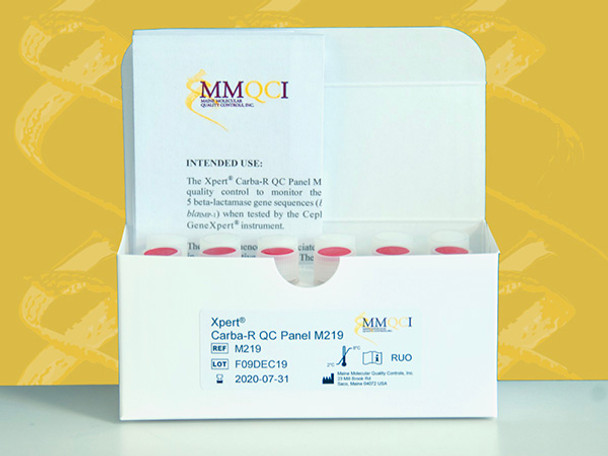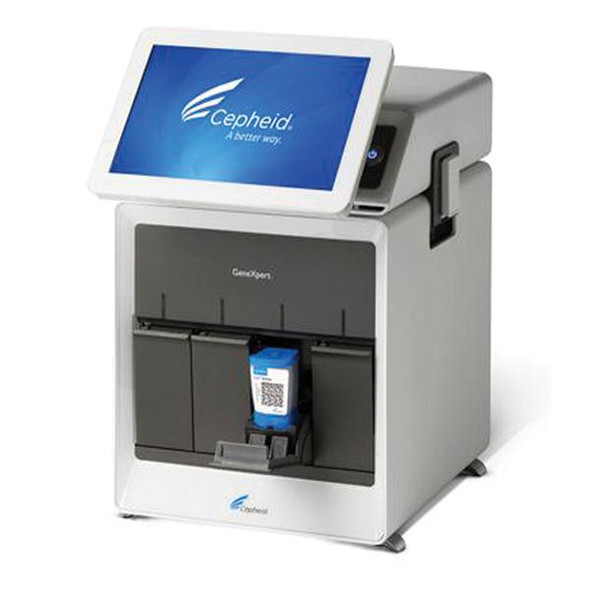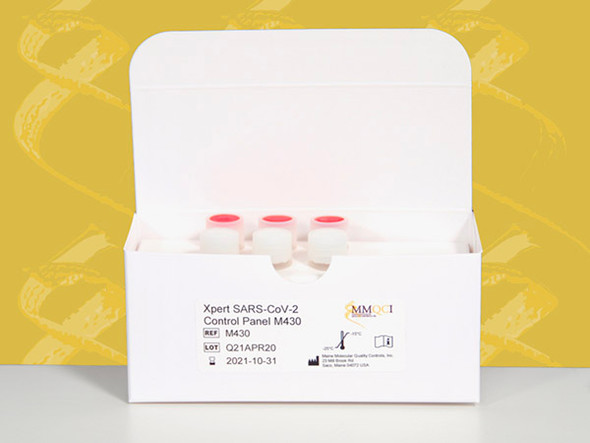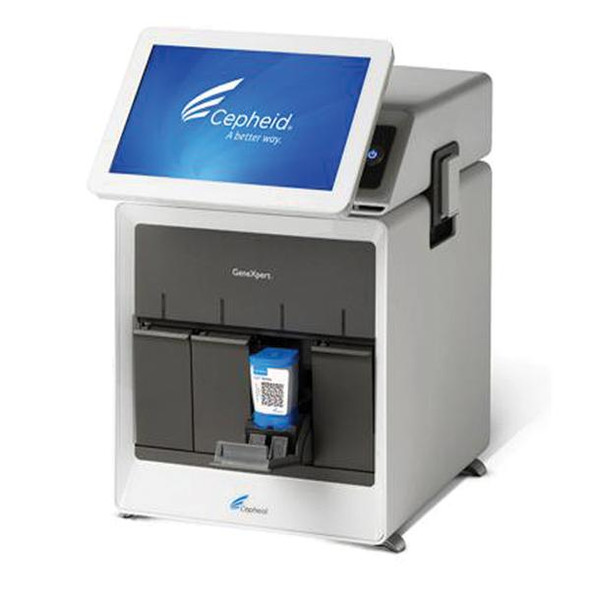Description
MMQCI Xpert® Carba-R QC Panel M219; P/N M219
Kit Contains: 12 tubes x 50µL
Xpert® Carba-R Positive Control (6), P/N M2162517
Xpert® Carba-R Negative Control (6), P/N M2171717
Xpert® Carba-R QC Panel M219 DataSheet
INTENDED USE:
The Xpert® Carba-R QC Panel M219 is intended for in vitro use as a quality control to monitor the detection and differentiation of 5 beta-lactamase gene sequences (blaKPC, blaNDM, blaVIM, blaOXA-48, and blaIMP-1) when tested by the Cepheid Xpert® Carba-R Assay on the GeneXpert® instrument.
The gene sequences are associated with carbapenem-non-susceptibility in gram-negative bacteria. The global spread of carbapenem non- susceptible bacteria is a critical public health issue. 1,2 These bacteria are often resistant to all beta-lactam agents and frequently are co- resistant to multiple classes of other antimicrobial agents, leaving very few treatment options.3
Xpert® Carba-R QC Panel M219 cannot be cloned, sold, or transferred without the explicit written consent of MMQCI.
PRODUCT SUMMARY and PRINCIPLE:
Xpert® Carba-R QC Panel M219 contains Xpert® Carba-R Positive Control and Xpert® Carba-R Negative Control. Xpert® Carba-R Positive Control carries all 5 beta-lactamase gene sequences detected by Xpert® Carba-R Assay. Xpert® Carba-R Negative Control does not carry any beta-lactamase gene sequences.
Best practice is to establish a quality control program for every assay performed by the laboratory.4,5 Routine use of quality controls that are consistent lot to lot assists the laboratory in identifying shifts, trends, and increased frequency of random errors caused by variations in the test system, such as failing reagents. Early investigation can prevent failed assay runs.
COMPOSITION:
The Xpert® Carba-R QC Panel M219 is comprised of 12 tubes, 50µL each of synthetic DNA encapsulated in chemically killed and fixed, non- pathogenic bacterial cells, suspended in buffer and preservative. Six (6) of the tubes are Xpert® Carba-R Positive Control, which carries all 5 beta-lactamase gene sequences. The other 6 tubes are Xpert® Carba-R Negative Control which does not carry any beta-lactamase gene sequences. Table 1 lists the beta-lactamase gene sequences that are monitored by the Xpert® Carba-R QC Panel M219 when tested by the Cepheid Xpert® Carba-R Assay on the GeneXpert® instrument.
INSTRUCTIONS FOR USE:
- Allow the control to come to room temperature (18° – 25°C).
- Use the control as DO NOT DILUTE.
- Immediately before use, mix the control by vortexing at highest speed for 10 - 15 seconds and then shake the tube down firmly to remove any droplets caught in the
- Transfer 50µL of control to a Sample Reagent vial using a quantitative
- Close the Sample Reagent cap and vortex at high speed for 10 seconds.
- Analyze the control as you would a patient
- Discard after use according to your local and federal
STORAGE and STABILITY:
Xpert® Carba-R QC Panel M219 should be stored at 2° - 8°C. Unopened Xpert® Carba-R QC Panel M219 is stable through the expiration date printed on each tube when stored refrigerated (2° – 8°C). Xpert® Carba-R Positive Control and Xpert® Carba-R Negative Control are for single use. Discard after use according to your local and federal regulations.
PRECAUTIONS and WARNINGS:
- Do not dilute Xpert® Carba-R QC Panel
- This product is intended for in vitro analytical testing and is provided for Research Use Only, not for use in diagnostic
- This product does not contain any biological material of human or animal origin.
EXPECTED VALUES:
The laboratory should follow Good Laboratory Practice (GLP) and establish its own performance characteristics for Xpert® Carba-R QC Panel M219 in demonstrating adequate system performance. Recoveries may vary depending on instrumentation, reagents and systematic or random errors. The expected results when the controls are analyzed are listed in Table 1.
Table 1: Xpert® Carba-R Assay Results
|
Assay |
Xpert® Carba-R Positive Control P/N M2162517 |
Xpert® Carba-R Negative Control P/N M2171717 |
|
IMP VIM NDM KPC OXA |
Detected Detected Detected Detected Detected |
Not Detected Not Detected Not Detected Not Detected Not Detected |
ORDERING INFORMATION:
Xpert® Carba-R QC Panel M219; P/N M219 Kit Contains: 12 tubes x 50µL
Xpert® Carba-R Positive Control (6), P/N M2162517
Xpert® Carba-R Negative Control (6), P/N M2171717
References
- Kallen, A. & A. Srinivasan. 2010. Current epidemiology of multidrug-resistant gram- negative bacilli in the United States.Infect Control Hosp Epidemiol. 31 Suppl 1: S51 -54.
- Nordmann, & G. Cornaglia. 2012. Carbapenemase-producing Enterobacteriaceae: a call for action! Clin Microbiol Infect.18: 411-412.
- Cornaglia, , H. Giamarellou & G. M. Rossolini. 2011. Metallo-beta-lactamases: a last frontier for beta-lactams? Lancet Infect Dis. 11: 381-393.
- ISO 15189: Medical laboratories – Particular requirements for quality and
- CAP Molecular Pathology Checklist; Commission on Laboratory Accreditation, Laboratory Accreditation Program, 20000
2 Reviews
-
recommendable
This is a highly recommendable company, as my experience with Gentaur has been excellent and all the products are high quality.
-
Xpert® Carba-R QC Panel M219
The Xpert Carba-R QC Panel M219 is intended for in vitro use as a quality control to monitor the detection and differentiation of 5 beta-lactamase gene sequences (blaKPC, blaNDM, blaVIM, blaOXA-48, and blaIMP-1) when tested by the Cepheid Xpert Carba-R Assay on the GeneXpert instrument. The gene sequences are associated with carbapenem-non-susceptibility in gram-negative bacteria. The global spread of carbapenem non-susceptible bacteria is a critical public health issue. 1,2 These bacteria are often resistant to all beta-lactam agents and frequently are co-resistant to multiple classes of other antimicrobial agents, leaving very few treatment options.3













